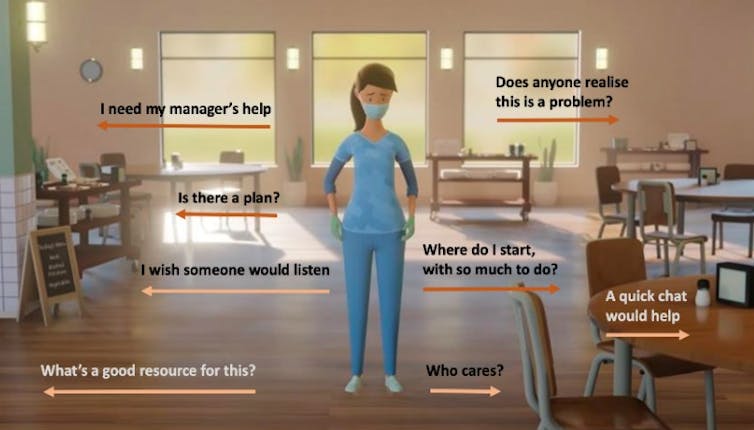As COVID-19 fades from public consciousness, workers in long-term care (LTC) are at risk of falling out of sight and out of mind.
Beyond the death tally headlines that propelled them into the spotlight during the first waves of COVID-19, LTC workers had to manage unprecedented pandemic demands — and encountered correspondingly extreme mental health challenges.

These skilled workers spend their days and nights at the side of residents who are navigating some of life’s most profound experiences, including incapacitation, illness and death.
The unglamorous nature of this sector invokes topics many would prefer not to think about, but it is vital we keep shining a light on LTC workers’ needs to ensure that lessons from the pandemic are acted upon.
Recommendations for support
Collaborating with LTC workers throughout Canada, our Calgary-based team of researchers, which includes those with first-hand LTC experience, aims to do just that. Through Canadian Institutes of Health Research funding, we produced a two-minute video animation to communicate the mental health needs of the LTC workforce, and are developing a mental health app tailored to LTC workers, funded by the Alberta Ministry of Labour and Immigration.
We also published recommendations for how organizations across Canada can support LTC workers, in a new report commissioned by Healthcare Excellence Canada (HEC).
Our research to better understand and support LTC workers entailed in-depth interviews with 75 LTC workers at LTC organizations in Alberta, British Columbia and Ontario.
We asked about their mental health experiences in relation to their work, and we heard stories of strength and resilience along with stories of distress and fear. Our two-minute animation, We needed help, but we were supposed to be the help, encapsulates these responses.
Work can provoke moral distress
We further focused our research by conducting an online moral distress survey to which 484 LTC workers responded.
Moral distress occurs when staff know what needs to be done, but feel powerless to do it. We learned about a range of morally distressing aspects of LTC work during the pandemic, such as being unable to respond to residents’ needs for attention, and being powerless to follow the wishes of their family members.

These morally distressing experiences left workers feeling helpless and isolated, and we identified an immediate need for personal, tangible support on site.
Reducing moral distress through workplace community
Importantly, workers shared ideas for mitigating moral distress at work, and these focused on improved communication, collaboration and support. We are now creating a user-centred mental health app that is being developed alongside LTC workers through participation in research focus groups.
Mental health apps can be a quick and effective way for improving user well-being, and are an increasingly accessible, cost-effective workplace tool for employers. Our LTC app will include features for improving communication, such as real-time links with colleagues and managers about their mental health. We also plan to include peer support capability, plus peer and manager problem-solving features.
One of our goals is to shift away from standard employee mental health approaches, which focus on individual actions outside of the workplace, such as meditation, eating and sleep habits. Instead, we want to emphasize that mental health in LTC is a shared responsibility.

By targeting the need for workplace communication, collaboration and support, our app will encourage proactive workplaces to initiate actions that have wider and shared responsibility for completion.
What more can LTC workplaces do?
During 2021 and 2022, the Health Standards Organization (HSO), a non-profit organization based in Ottawa, carried out a public review into LTC with the aim of creating new standards through consultation with residents, families, staff and stakeholders.
When the final standard was published in January 2023, our team was gratified to see worker moral distress noted as a key consideration for enabling healthy, competent and resilient staff working under healthy conditions. We want our research to strengthen this push to effect real change, and not only because this will improve the mental health of workers in LTC, but also for the downstream positive effect it will have on LTC residents.
With this aim, our research lab, the Creating and Renewing Equity through Research Lab, published our own report, commissioned by HEC, in May 2023.

Paths to Strengthen Long-term Care Worker Resilience reports the LTC worker ideas and feedback we collected, and sets out recommended, actionable workplace practices. These recommended paths are summarized in the infographic above. Going forward, it is critical that the HSO standard is implemented at all LTC workplaces across Canada, and that these workplaces have the provincial and federal support they need.
The COVID-19 pandemic may appear to be behind us, but for many workers in LTC, the pressure has not fully abated and concerns about future crises remain. As the director of care at one LTC home in Alberta told us: “We’re yes people. We’re helpers, and we don’t put ourselves first. We don’t. Until sometimes it’s too late.”

